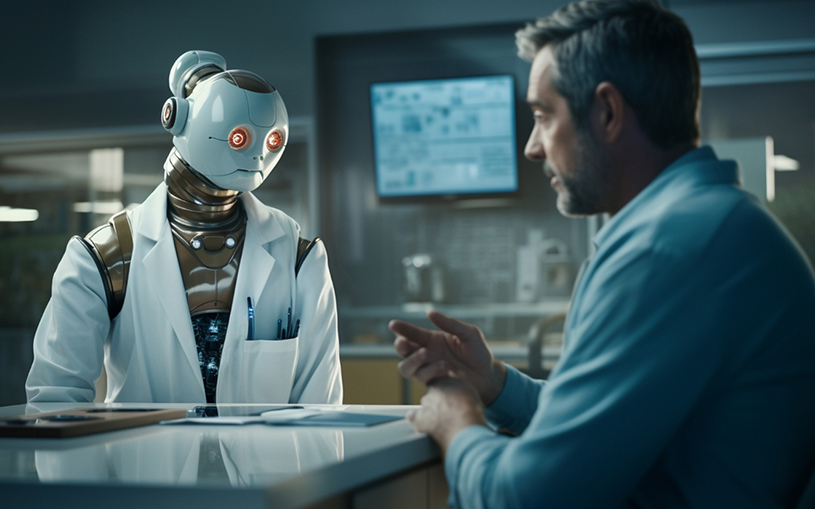The Power of Artificial Intelligence in Healthcare

Introduction
In recent years, the advancements in artificial intelligence (AI) have permeated numerous industries, and the healthcare sector is benefitting from its transformative potential. AI is revolutionizing patient care, streamlining processes, and providing healthcare providers with invaluable insights. From early disease detection to precision medicine and remote monitoring, AI is changing the face of healthcare for the better.
Revolutionizing Patient Care
The rapid developments in artificial intelligence (AI) have been transforming various industries, and healthcare is no exception. AI has the potential to revolutionize patient care, making it more efficient, accurate, and personalized. With its ability to process large amounts of data and identify patterns, AI is helping healthcare professionals in diagnosing diseases, predicting outcomes, and even developing new treatment methods. Let’s dive deeper into how AI is reshaping the healthcare landscape.
Early Diagnosis and Disease Detection
One of the most significant applications of AI in healthcare is its contribution to early diagnosis and disease detection. AI algorithms can analyze vast amounts of medical data, including medical history, symptoms, lab results, and imaging scans, to identify patterns and detect diseases at an early stage. This can significantly improve patient outcomes by allowing for timely intervention and treatment. For instance, AI-powered algorithms have shown remarkable accuracy in detecting various types of cancer, such as lung cancer and breast cancer, from medical images. These algorithms can analyze images and flag potential abnormalities, serving as a valuable tool for radiologists and oncologists
Precision Medicine
Another area where AI is making a substantial impact is in the field of precision medicine. Using AI, healthcare professionals can analyze an individual’s genetic makeup and combine it with other medical data to develop personalized treatment plans. This approach takes into account the patient’s unique characteristics, such as their genetic predispositions, lifestyle factors, and treatment response, to provide targeted therapies. AI algorithms can identify the most effective treatments for a specific patient, minimizing trial and error and optimizing medical interventions.
Health Monitoring and Remote Care
AI-powered wearables and remote monitoring devices are becoming increasingly prevalent in the healthcare sector. These devices can collect real-time data on various health parameters, such as heart rate, blood pressure, and glucose levels, and send it to healthcare professionals for analysis. AI algorithms can then analyze this data, detecting any anomalies or patterns that may require immediate attention. This enables proactive healthcare interventions and preventive measures, reducing hospital readmissions and improving overall patient care.
Enhancing Clinical Decision Making
AI is also proving to be a valuable tool for healthcare professionals in making clinical decisions. By analyzing vast amounts of patient data, including medical records, lab results, and research papers, AI systems can provide insights and recommendations to healthcare practitioners. These AI systems can help in diagnosing complex conditions, predicting disease progression, and recommending treatment options based on the patient’s unique circumstances. By leveraging AI technology, healthcare professionals can make more informed decisions, leading to improved patient outcomes.
Ethical Considerations and Challenges
While the benefits of AI in healthcare are substantial, it is crucial to acknowledge and address the ethical considerations and challenges associated with its implementation. Issues such as data privacy, security, and bias in algorithmic decision-making need to be carefully addressed to ensure that AI is used responsibly and ethically.
Enhanced Diagnostics and Disease Prediction
AI has the capability to analyze vast amounts of patient data, including medical records, lab results, and genetic information. This enables precise and early diagnosis of diseases, as well as the prediction of potential health risks. AI-powered algorithms can identify patterns and anomalies that may not be easily detectable by human doctors alone. By aiding in accurate and timely diagnoses, AI can significantly improve patient treatment and prognosis.
Personalized Treatment Plans
Artificial Intelligence helps healthcare professionals in creating personalized treatment plans for patients. By considering individual characteristics such as age, genetic makeup, medical history, and lifestyle factors, AI algorithms can make recommendations tailored specifically to each patient’s needs. This not only improves treatment efficacy but also minimizes adverse effects and unnecessary interventions.
Efficient Drug Discovery and Development
Traditional drug discovery and development processes are time-consuming and expensive. However, AI algorithms can expedite these processes by analyzing vast amounts of data and predicting the effectiveness of potential drugs. The use of AI in drug discovery allows for the identification of new treatment targets and the repurposing of existing drugs, leading to more effective and cost-efficient therapies.
Remote Patient Monitoring
The integration of AI with wearable devices and telehealth technology enables remote patient monitoring. Patients can be continuously monitored in real-time, providing valuable data to healthcare professionals. AI algorithms can analyze this data to detect early warning signs, allowing for immediate intervention and prevention of serious complications. Remote patient monitoring also reduces the need for frequent hospital visits, making healthcare more accessible and convenient for patients.
Robotic Surgery and Assistance
AI plays a crucial role in robotic surgery, improving surgical precision and outcomes. Robotic systems equipped with AI algorithms can analyze preoperative data, assist surgeons during procedures, and even perform certain tasks autonomously. This results in shorter operation times, reduced complications, and faster recoveries. Additionally, AI-powered robots can assist healthcare professionals in repetitive tasks, freeing up time for more critical and complex procedures.
Conclusion
The power of Artificial Intelligence in healthcare is undeniable. From advanced diagnostics and personalized treatment to efficient drug discovery and robotic assistance, AI brings numerous benefits to patients, healthcare professionals, and the industry as a whole. As AI continues to evolve, it is essential to embrace its potential and leverage its capabilities, ensuring that healthcare becomes more accessible, efficient, and effective for everyone.